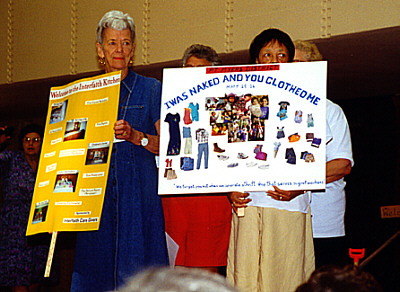General Board of Global Ministries
![]()
UM Information
UM
Reporter
![]()
Florida Southern College
![]()
Bethune
Cookman College
![]()
FL UM Children's Home
![]()
|
|
All ages focus on urban issues at school |
|
Photo by Michael Wacht |
| United Methodist Women from the Florida Conference's 14 districts display signs declaring, "We Forget You Not...," and explaining how they remember Jesus Christ through service in urban areas. The displays were part of the School of Christian Mission's closing ceremonies. |
|
By Michael Wacht LAKELAND — More than 250 participants in the weeklong School of Christian Mission June 24-28 at Florida Southern College here spent much of their time discussing the impact of urban culture on American life and how the church should respond. The 19 high-school students who attended also got some hands-on mission experience. "The best day was…when we went to the Tampa United Methodist Centers," said the Rev. Brenda Lewis, Florida Southern College’s chaplain and youth teacher for the school. The youth spent the morning at a day-care center working with children and infants and the afternoon visiting a senior center. "They [the retired people] taught the kids how to play bingo," Lewis said. "They even let the kids be the callers." For the adults, much of the week’s focus was on understanding the relationship between urban issues and society. "If I have done anything here this week, it was to help people see that much of what occurs in our society has its birth in the cities," said Lorene Wilbur, deputy general secretary of the General Board of Global Ministries and teacher of the school’s class "God’s People in an Urban Culture." "It affects how we live, whether we are living in a rural area or a suburban area," she said. "In today’s society where technology is bringing us closer together, we cannot escape any of the issues that affect God’s people." Gail Wiltse, a member of Howe Memorial United Methodist Church in Crescent City, said she was not sure why she took the class since she lives on "10 acres in the middle of nowhere." She said she learned that technology has connected people like never before, but has also led to a breakdown in interpersonal communications. "Yes, I live in a remote area, but I’m also technologically connected," she said. "Computers, cell phones, TV…but that’s part of the problem. People watch TV instead of interacting with other people." Much of Wilbur’s class time was spent in discussion. Students identified issues that have their start in urban settings, but affect people regardless of where they live. Class members focused on health care; children’s issues; racial, age and gender discrimination; and environmental issues. The youth identified additional issues facing today’s cities, including diversity, family and sexual issues, and the competitiveness of the fashion and entertainment industries. As part of the combined emphasis on urban issues and Paul’s letters to the Corinthians, Lewis asked the youth to circle the issues on their list that were also present in Paul’s day. "We focused on what Paul talked about…the role of the church in addressing those problems and dealing with diversity and conflict in positive ways," she said. High on the adults’ list was health care. "In the discussion about solutions, we worked on things the church could do…where the church can be involved," Wilbur said. "We identified programs churches can undertake." Among those were transportation for the elderly, parish nursing, health fairs, and SHARE and Meals on Wheels programs. Wiltse said each church needs to decide its role based on the needs of its community. The Council of Bishops’ Initiative on Children and Poverty and its related Hope for the Children of Africa prompted the United Methodist Women to choose the urban ministry topic, focusing on the issues addressed by the two initiatives, according to Opal Winebrenner, dean of the school. The school also included a Bible study on Paul’s letters to the Corinthians and a geographic study focused on Africa and the children who live in the United Methodist Church’s central conferences. More than 600 people attended the School of Christian Mission, which included the weeklong event and a weekend school. Top
of this page |

